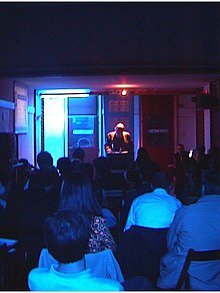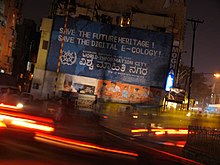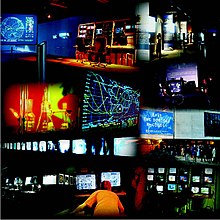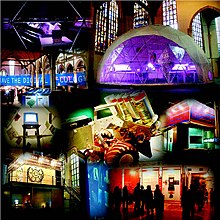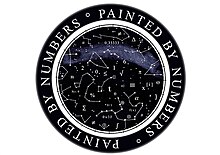World-Information.Org
| World.Information.Org (WIO) |
|
|---|---|

|
|
| purpose | Research into new technologies, future communication environments and their implications |
| Chair: | Konrad Becker (artist) |
| Establishment date: | 1999 |
| Seat : | Vienna |
| Website: |
world-information.net world-information.org |
World-Information.Org is a non-profit organization that creates critical public opinion in the fields of art , science and technology . To this end, it organizes exhibitions and conferences and issues a series of publications in which the effects of digital network technologies on social and cultural dynamics are discussed. The specific perspective lies in each case on the possibilities of an emancipatory media practice. World-Information.Org thus contributes to the democratic development of society , politics and culture according to its own presentation .
World Information Institute
The World-Information Institute (WII) is an integral part of World-Information.Org , based in Vienna, and serves as a permanent research facility. In numerous exhibitions, conferences and international panel discussions, fundamental questions of the information society are discussed and a critical awareness of the cultural and social effects of digital cultural technologies is conveyed.
Due to the expertise gained in this way, the World-Information Institute is also invited to give international lectures. The institute is also the editor of several book publications.
The institute works with a network of international media initiatives (including Critical Art Ensemble , RTMark , The Yes Men , De Balie , Kuda.org , De Waag , Adbusters Media Foundation , Institute for Applied Autonomy , Sarai (Media Lab), V2 Institute for the unstable media and nettime ).
Idea and structure
World-Information.Org asks questions from various perspectives on information production, manipulation, distribution and control as well as on the cultural, social, economic and technological foundations of a globalized information society. Areas such as intellectual property , a politics of the commons , knowledge organization and search technologies as well as the thematization of new surveillance technologies are just as much part of the work of World-Information.Org as dealing with urban development and the effects of new technologies on modern art. World-Information.Org is characterized by the variety of topics that are brought into the discussions, exhibitions and publications by scientists, artists and intellectuals from different countries and disciplines. There have already been particularly prominent collaborations with Saskia Sassen , Bruno Latour , Chantal Mouffe , Lawrence Lessig and Arundhati Roy .
World-Information.Org is an initiative of the Institute for New Cultural Technologies / t0, founded in 1994, which gained international recognition primarily through the network culture institution Public Netbase (1994–2006) and has been running the online policy orientation aid Wahlkabine.at in Austria since 2002 . The director is Konrad Becker , the board members include Felix Stalder and Francisco de Sousa Webber .
Funding is provided on a project-by-project basis through funding programs from a wide range of institutions: through the EU (e.g. EU-India Economic Cross Cultural Program), the UN (e.g. Austrian UNESCO Commission), ministries in Austria and internationally (e.g. B. BMUKK , BMEIA ), through cities and regions ( City of Vienna , Region Île-de-France ), cultural institutes (e.g. Goethe-Institut Max Mueller Bhavan; Forum Culturel Autrichien Paris ), state or privately established foundations (e.g. B. European Cultural Foundation , Fondation Daniel Langlois, Mondriaan Stichting), as well as through the partner organizations (e.g. Technisches Museum Wien , National Museum of American History - Smithsonian Institute ) and sponsors (e.g. xs4all).
Future Non Stop
Future Non Stop is an online archive based on semantic search and indexing technologies. The projects of World-Information.Org are publicly accessible here in the form of text, video and image material. The archive also includes the earlier activities of the Institute for New Cultural Technologies, which date back to 1994. This means that documents on new media, politics and art from almost twenty years are accessible.
history
World-Information.Org has been organizing exhibitions, conferences, workshops and art projects since 2000.
WIO - Brussels 2000
World-Information.Org was the lead project in the field of media within the framework of the European Capital of Culture Brussels 2000, which discussed the social, cultural and political dimensions of the new information and communication technologies.
The exhibition (30 June – 30 July 2000, Center Brussels 2000) presented objects and current research results on various topics such as the history of modern communication technologies, the "big players" in the IT industry, financial networks and human rights. All resources are available on the world-information.org page.
In addition, the “World InfoCon” conference (July 13/14, 2000) took place at which Philippe Quéau , Saskia Sassen ( University of Chicago , London School of Economics ), Philip Hammond , Duncan Campbell (journalist, IPTV Ltd.) , Simon Gordon Davies (Director Privacy International; Computer Security Research Center, London School of Economics), Eric Kluitenberg (Coordinator New Media Program, De Balie) and Steve Kurtz ( Critical Art Ensemble ) spoke.
WIO - Vienna 2000
The exhibition "World-Information.Org" was shown in the same year at the Technisches Museum Wien (November 24th - December 24th, 2000) and supplemented by a program of guided "Dialogue Tours" with media theorists, publishers, journalists and artists. At the “World Information Forum” conference (November 24, 2000), among others, Hito Steyerl , Ben Bagdikian (University of California) and Steve Wright (OMEGA Foundation) spoke .
WIO - Amsterdam 2002
The “World-Information.Org” exhibition was shown in the Oude Kerk in Amsterdam in 2002 (November 15– December 15, 2002) and was supplemented by an intensive workshop program. At the “World-InfoCon” conference (December 6-7, 2002, De Balie Center for Culture and Politics), Brian Holmes and Volker Grassmuck spoke .
WIO - Novi Sad / Belgrade 2003
"World-Information.Org" was shown in Serbia in two locations: first in Novi Sad (March 22 – April 5, Museum of Vojvodina) and then in Belgrade (April 19 – May 5, 2003, Museum of Modern Art ). Art projects, book presentations and discussions took place in the associated “World Information Lounge”. Speakers for the “World Information Forum” conference (April 20, 2003) included Marko Peljhan , Petar Milat , Sjoera Nas and Gordan Paunovic .
World-Information City / Towards a Culture of Open Networks - Bangalore 2005
As part of the transnational project "Towards a Culture of Open Networks", a collaboration with the organizations Sarai-CSDS, Delhi, and Waag Society, Amsterdam took place. As a result of this cooperation, the project documentation "In The Shade of the Commons - Towards a Culture of Open Networks" was created. Local partners in Bangalore were Mahiti, the Alternative Law Forum and the Srishti School of Art, Design and Technology.
The "World Information City" exhibition took place at various locations (November 15-19, 2005, e.g. Russell Market, Tasker Town) and was supplemented by workshops and guided tours. Large billboards, posters, stickers and “mobile displays” were distributed across the city for an information campaign on intellectual property .
Booker Prize Winner Arundhati Roy , Lawrence Liang , Solomon Benjamin , Shuddhabrata Sengupta and David Lyon spoke at the “World-Information City” conference (November 17-18, 2005, Cubbon Park Auditorium, Bangalore) .
Deep Search (I) - Vienna 2008
The “Deep Search” conference dealt critically “with the social and political dimensions of our navigation through the depths of knowledge”. With contributions by Paul Duguid (School of Information, University of California, Berkeley ), Claire Lobet-Maris (Computer Science Institute University of Namur), Bernhard Rieder (Département Hypermédia, Université de Paris VIII - Vincennes Saint-Denis), Gon Zifroni & Tsila Hassine (Metahaven, Amsterdam and Brussels & media artist and web-programmer) et al
World-Information City - Paris 2009
In 2009 World-Information.Org was invited to organize a “World Information City” conference as part of the “Futur en Seine” festival (May 30–31, 2009, Maison des Métallos). Speakers included Bruno Latour , Saskia Sassen , Stephen Graham , Carlo Ratti , John Urry and Eyal Weizman .
Critical Strategies in Art and Media - New York 2009
In September 2009, “Critical Strategies in Art and Media”, a conference on the future of cultural freedom and cultural intelligence in digital theory and practice, took place at the Austrian Cultural Forum in New York. Participants included Ted Byfield ( nettime ), Steve Kurtz ( Critical Art Ensemble ), Amanda McDonald-Crowley (Eyebeam), Claire Pentecost (Continental Drift), Peter Lamborn Wilson (Temporary Autonomous Zone), Konrad Becker (World-Information Institute) and Jim Fleming (Autonomedia).
Deep Search (II) - Vienna 2010
In 2010 the discussion about the politics of search was continued in the conference “Deep Search II”: “The automatic classification of data, their indexing and evaluation are at the center of new communication environments. Behind this is not only the claim to organize the information available in the world, but also to classify human relationships: from the management of the modern workplace or the consumers in mass societies to the biopolitical management of the network society. ”With contributions by Chad Wellmon ( University of Virginia ), Sebastian Giessmann ( Humboldt University Berlin ), Matteo Pasquinelli ( Queen Mary, University of London ), Karl H. Müller (Vienna Institute for Social Science Documentation and Methodology).
The “Shared Digital Futures” conference dealt with the effects of digital network technologies on cultural production and examined, for example, the new role of the work of art as both an end product and raw material for further cultural production, models for sustainable funding of the commons and new forms of collective authorship. With contributions by Jamie King, Eric Kluitenberg, ZOE.LEELA, Inke Arns, Michel Bauwens and R. Trebor Scholz, among others.
Information as Reality - Linz 2014
The conference and exhibition "Information as Reality" - a cooperation with Springerin magazine and Ars Electronica in the LENTOS art museum in Linz - dealt with critical cultural practices in digital networks and the increasing change in the social reality of digital models and virtual information regimes. Creative artists have played an important pioneering role in the settlement of digital worlds. What role can they play 20 years after the Internet spread? With U. a. Steve Kurtz, Mediengruppe Bitnik, Alesandro Ludovico, Marko Peljhan, Christian Höller.
Digital clouds and urban spaces - Vienna 2014
The conference "Digital Clouds and Urban Spaces" at the Architekturzentrum Wien dealt with smart cities and the city as an information system, where urbanity is increasingly shaped by networks of information technologies. With Adam Greenfield (USA), Marleen Stikker (NL), Thomas Grüter (DE), Christoph Laimer (AT) u. a.
Critical Network Practice - Vienna 2015
In cooperation with springerin magazine, the World-Information Institute developed a critical review of 20 years of network culture, to which issue XXI / 1 (winter 2015) of the magazine was dedicated. The issue was presented in January 2015 in the event "Critical Net Practice: Information as Reality?" At the MAK in Vienna. With Marina Gržinić (Ljubljana), Zoran Pantelić (Novi Sad), Konrad Becker (Vienna) and Christian Höller (Vienna).
Algorithmic Regime - Vienna 2015/2016
The international conference and event series "Algorithmic Regime" examined the growing influence of digital control systems and their cascading effects of power on cultural and social realities. In addition to the conference, the event “Algorithms are no Angels” with Matthew Fuller and Graham Harwood, a video interview with Stefano Harney and an audiovisual evening presented an annotated remix of film clips and documentaries that relate to automated control systems . With Peter Purgathofer (AT), Thomas Sturm (DE), Antoinette Rouvroy (BE), Btihaj Ajana (UK), Francesca Musiani (FR), Olga Goryunova (UK), Gerald Raunig (AT) u. a.
Publications online
- World Information IP City Edition Geneva 12/2003 (PDF file; 1.50 MB)
- World Information IP City Edition Tunis 11/2005 (PDF file; 3.15 MB)
- Chapter World-Information.Org from the book '' Public Netbase. Non Stop Future '' (Revolver 2008), accessed on 30-08-2013
- Felix Stalder, Martin Wassermair, Konrad Becker: “Cultural production and media use in everyday life. Copyright problem areas and political solution prospects ”, study commissioned by the Chamber for Workers and Salaried Employees for Vienna, Vienna: AK 2013 (PDF; 104 kB)
- derstandard.at, July 27, 2009
- Konrad Becker: "Coercion and seduction in the control society - self-measurement and wish fulfillment in the digital data room", in: Medienimpulse 4/2014 (accessed on 16-12-2016)
- "Naked in a state of emergency: Terror, secret services and classification war", in: Berliner Gazette 2014 (accessed on 16-12-2016)
- Wahlkabine.at - press review (accessed on 30-09-2016)
- "Konrad Becker Interview" video from Berliner Gazette 2016 on Vimeo (accessed on 16-12-2016)
Publications print
- Clemens Apprich, Felix Stalder (ed.): Forgotten future. Radical net cultures in Europe. A publication by the World Information Institute, Bielefeld: transcript 2012, ISBN 978-3-8376-1906-5
- Konrad Becker: Dictionary of Operations. Deep Politics & Cultural Intelligence . New York, Autonomedia 2012, ISBN 978-1-57027-261-5
- Konrad Becker (Red.): The politics of the infosphere. World-Information.Org , Bonn: Federal Agency for Civic Education 2002, ISBN 978-3-89331-464-5 , and: Opladen: Leske + Budrich 2003, ISBN 3-8100-3866-0
- Konrad Becker, Felix Stalder (Red.): Stay away from our network! Network Political Convention of Austrian Civil Society , Vienna, Linz: 2013, ISBN 978-3-200-03228-6
- Critical network practice . jumper. Booklets for Contemporary Art , XXI / 1 (Winter 2015)
- Konrad Becker, Felix Stalder (Eds.): Deep Search. Politics of Searching Beyond Google. A publication by the World Information Institute, Studienverlag & Transaction Publishers, 2009, ISBN 978-3-7065-4794-9
- Fiction and influence . A publication by the World Information Institute, Vienna: Löcker 2016, ISBN 978-3-85409-663-4
- Konrad Becker, Martin Wassermair (Hrsg.): Phantom Kulturstadt. A publication by the World Information Institute, Vienna: Löcker 2009, ISBN 978-3-85409-506-4
- After the end of politics. A publication by the World Information Institute, Vienna: Löcker 2011, ISBN 978-3-85409-552-1
- Battle zones in art and media. A publication by the World Information Institute, Vienna: Löcker 2008, ISBN 978-3-85409-483-8
Web links
Individual evidence
- ↑ Some examples: OSCE Mediterranean Seminar, Rhodes, Greece, 2002 , Conference Surveillance and Control, Tate Modern, London, England, 2003, Conference 30 Years of Schengen - Challenges for the EU in times of crisis | 17 & 18 december 2015 | Bruxelles ( Memento from December 17, 2015 in the Internet Archive ) Opening of Sciences Po Medialab, Paris, France, 2002, PRESS KIT ( Memento from December 12, 2015 in the Internet Archive ) Festival Transmediale, Berlin, Germany, 2009 (PDF file; 373 kB)
- ↑ delind.ec.europa.eu ( Memento from July 20, 2006 in the Internet Archive )
- ↑ List of project partners
- ↑ http://future-nonstop.org/ , accessed on 30-08-2013
- ↑ Springerin - Hefte für Gegenwartskunst, Heft 3/00 ( Memento of October 4, 2013 in the Internet Archive )
- ↑ World Infostructure Exhibition
- ↑ Wolfgang Sützl: World-Information City. The Indian IT metropolis Bangalore is the scene of a World-Information.Org project , in: Kulturrisse - magazine for radical democratic cultural policy, issue 1/2005
- ↑ http://world-information.org/wii/deep_search , accessed on 30-08-2013
- ↑ http://world-information.org/wio/program/paris
- ↑ http://world-information.org/wii/critical_strategies , accessed on 30-08-2013
- ↑ http://world-information.org/wii/deep_search2/ , accessed on 30-08-2013
- ↑ http://world-information.net/sdf/ , accessed on 30-08-2013
- ↑ http://world-information.net/information-als-reallichkeit/ (accessed on 21-09-2016)
- ↑ Digital clouds and urban spaces (accessed on 21-09-2016)
- ↑ a b Editorial ( Memento from December 1, 2016 in the Internet Archive ) (accessed on 21-09-2016)
- ↑ http://mak.at/jart/prj3/mak-resp/main.jart?reserve-mode=active&rel=de&content-id=1343388632770&article_id=1419146574316 (accessed on 21-09-2016)
- ↑ A short description of the series with links to all video documentaries can be found at http://world-information.net/algorithmische-regime-und-generative-strategien/ (accessed on 21-09-2016).
- ↑ The corresponding playlist is available at http://world-information.net/screening-der-algorithmischen-imagination/ (accessed on 21-09-2016).
- ↑ online: http://www.bpb.de/shop/buecher/schriftenreihe/36071/die-politik-der-infosphaere (accessed on: 30-09-2016)
- ↑ online: http://npk.servus.at/npk_buch_rgb.pdf (accessed on: 30-09-2016)

